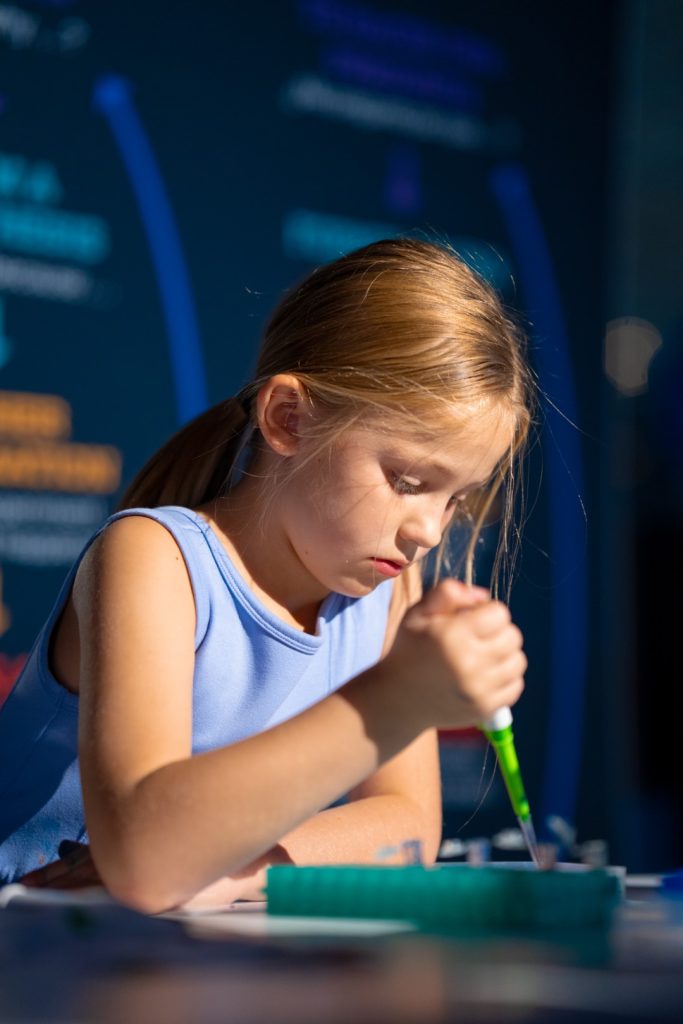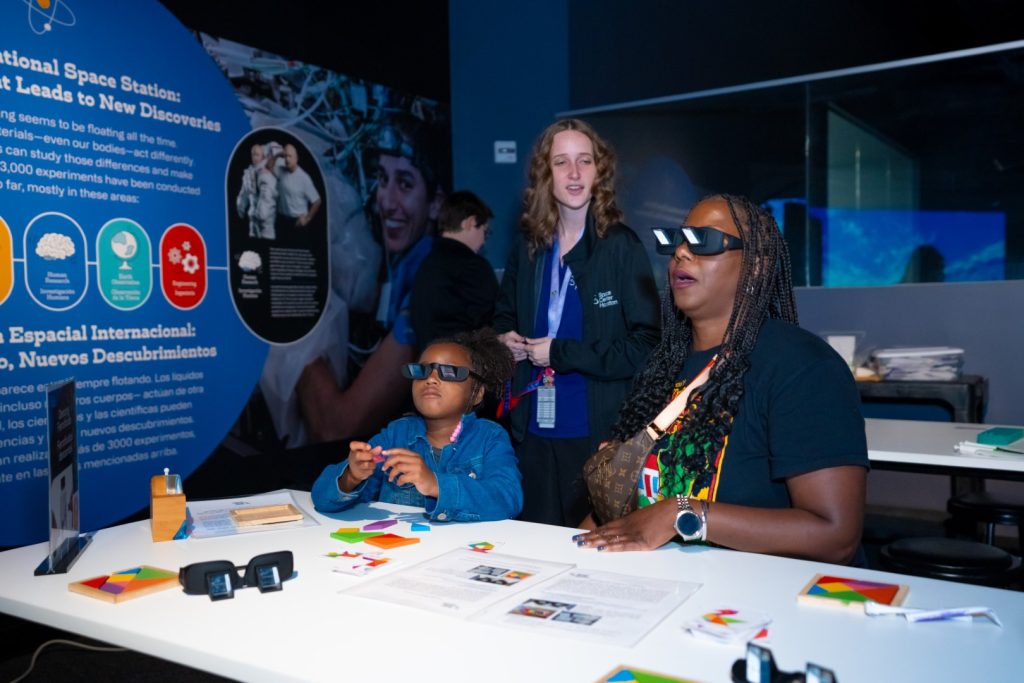Home » Support » Mission Impact » Citizen Science Ignites the Spark of Curiosity
Space Center Houston invites visitors to not only observe the past, present, and future of space exploration but also to actively engage directly in the science research taking place in space now. The innovations that make human spaceflight possible also generate many technologies we use here on Earth, boosting economic growth and fostering new career opportunities. Our unique access to NASA allows us to create programs that ignite the spark of curiosity for aerospace research and allow the public to directly participate in authentic space science experiments.
One of our flagship initiatives is the Scientist in Residence Program, led by our chief science officer and current NASA astronaut, Dr. Megan McArthur. Established in 2018 with support from Barrios Technology, this program connects the public with real-world scientific research, showcasing the importance of and profound impact space exploration has on our everyday lives.
Our science research manager, Dr. Andrea Ortiz, plays a pivotal role leading the program’s research initiatives and community science components, allowing people from all backgrounds to contribute valuable data to central scientific studies. Dr. Ortiz leads collaborations with top-tier institutions such as Johns Hopkins University, Baylor College of Medicine, Oak Ridge National Labs, and the Berkeley Eye Center, ensuring that Space Center Houston stays at the forefront of citizen science and transformative discovery.


In March 2024, Drs. McArthur and Ortiz took Space Center Houston to a new level with the inauguration of the Science Deck, a central hub for the public to participate in hands-on science experiments and research opportunities reflective of current studies conducted aboard the International Space Station (ISS). These experiences offer accessible, credible learning moments that foster curiosity and inspire scientific inquiry in guests of all ages.
One such Science Deck endeavor is the Ocular Alignment and Otolith Asymmetry study which investigates the ability of the inner ear to sense spatial awareness and the brain’s ability to use that information to control eye position and posture. Spearheaded by Dr. Mark Shelhamer, former chief scientist of NASA’s Human Research Program and current Professor and director of the Human Spaceflight Lab at Johns Hopkins University, Dr. Shelhamer has pioneered multiple studies examining the physiological impact of long-duration space flight on the human body.
A version of this Ocular Alignment study was performed with the Inspiration 4 Crew and will be performed by Axiom and Polaris Dawn astronauts on the International Space Station (ISS). On the Science Deck, guests have the opportunity to participate in the very same computerized game as astronauts, which requires individuals donning 3D glasses to align two differently colored horizontal and diagonal lines. These experiments not only allow guests to learn more about their own vestibular systems but also help contribute to scientists’ greater understanding of how our bodies adjust to the challenges presented by microgravity. Data generated in this study could help predict and prevent the motion sickness often felt by astronauts.
On the Science Deck, visitors can also test their reflexes and coding skills using pocket-sized micro:bit computers, learn how light and fluorescence help us investigate the makeup of our universe and the inner workings of our cells, and discover how an original NASA technology called ferrofluids applies magnetism to control a specialized colloid.
While research opportunities at the Science Deck may be out of this world, they also create down-to-earth connections for visitors. An inspiring moment unfolded when Estella Gillette, a retired NASA employee and member of Space Center Houston’s Innovation Circle, happened to sit down at the same activity as a young girl who was visiting Space Center Houston for the first time. Estella offered guidance to the girl as she worked through the challenge of the activity. This kind of unexpected and inter-generational connection is at the heart of how Space Center Houston unites individuals from diverse backgrounds with a shared passion for space exploration.
The incredible opportunities provided by the Scientist in Residence Program and the Science Deck exemplify our dedication to fostering scientific curiosity in all our guests. Our unique partnerships with companies like Barrios Technology help us engage the public with aerospace research, bringing out the scientist in everyone and inspiring a lifelong passion for exploration and discovery. These are the kind of opportunities that can only be found at Space Center Houston.
With your support and participation, Space Center Houston is able to provide impactful and revealing experiences to nearly 300,000 students and educators each year.
HOURS TODAY
Grab tickets for a full day of stellar experiences on Friday, March 13 at Moon 2 Mars Festival, presented by Wellby Financial!
Friday, February 6 | 7:30 p.m.
Witness history at the Official Visitor Center of NASA Johnson Space Center.